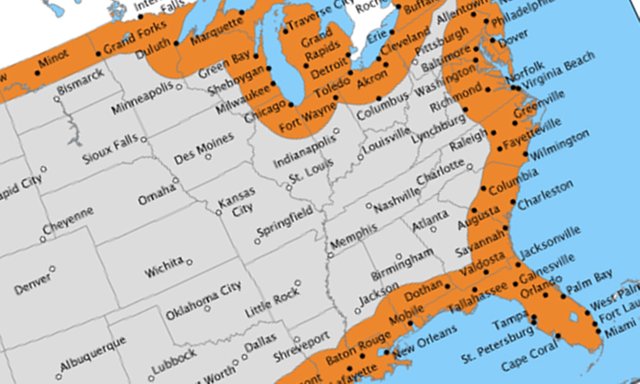The Constitution Free Zone

What is the “Reasonable Distance” Zone?”
- Customs and Border Patrol (CBP) is allowed to, without warrant, board vehicles and search for people without immigration documentation within a reasonable distance from any external boundary of the US. This includes international border as well as coastline. This Federal Regulation was adopted in 1953.
- Reasonable distance is considered to be 100 air miles from any external boundary.
- As of the 2010 Census, 100 million, or approximately 2/3 of all US residents live within this “Reasonable Distance” zone.
10 of the US’ largest cities fall squarely in this zone: New York City, Las Angeles, Chicago, Washington D.C. and many others. - Entire States fall squarely within this zone: Hawaii, Florida, Michigan, Maine, New Hampshire, Vermont, Rhode Island, Connecticut, New Jersey, Delaware
What’s actually happening?:
- Agents are boarding greyhound busses and trains asking people for their documentation.
- There are individual reports that agents boarding busses is also happening outside that 100 mile zone which causes confusion and raises questions about acting outside their jurisdiction. (https://www.aclu.org/blog/immigrants-rights/ice-and-border-patrol-abuses/one-woman-who-knew-her-rights-forced-border)
- There are approximately 100 permanent CBP checkpoints and an unknown amount of temporary checkpoints, including places like Loraine Ohio (6/27/18 - Personal account of a friend who lived in the neighborhood this took place in)
What are your rights if you’re in this “Reasonable Distance” Zone?
- US Citizens are not required to carry on their person proof of citizenship within the US.
- Border patrol agents’ jurisdiction is limited to immigration violations and federal crimes
- If you have a nonimmigrant visa (like tourism, medical treatment, business, temporary work, study) you are required to present this documentation when asked.
- Regardless of immigration status, you have the right to remain silent and inform the agents that you will only answer questions in the presence of an attorney.
- An agent cannot search you or your belongings without either “probable cause” or your consent.
- You can’t be arrested without probable cause. This means that the agent should have some facts about you that make it probable that you’re committing an immigration violation or violating federal law.
- Simply being silent alone does not meed the level of “propable cause” and neither does race or ethnicity.
Being Detained VS. Being In Custody:
The general rule based on a lot of federal cases is that the definition of being detained is being delayed for a short period, typically around 20 minutes. After that approximate 20 minute mark, that’s when you’re more likely than not considered being in custody and they cannot do that without a specific reason.
You can ask “am I free to leave?”
If the agent says yes then they are verbally confirming that you are not in custody. If the agent says no, then this, by default puts you in a situation where you’re somewhat informally in custody. If you are not free to leave, then you can ask why you are being detained, and the agent would then need to provide some sort of an answer and another opportunity to request an attorney.
——————————————————————————————————————————
https://constitutioncenter.org/blog/does-a-constitution-free-zone-really-exist-in-america/
https://www.vox.com/2018/6/21/17490904/customs-border-protection-patrol-checkpoints-100-miles-legal
——————————————————————————————————————————
Of course this is where I have to provide a disclaimer that I am not an attorney and none of this is officially legal advise. This is meant to help give you confidence if you’re in this type of situation. The best preparation is to think of how to react in a potentially stressful situation before you’re in that situation. Just like every family should have a “fire” plan, everyone should have an idea as to how to respond and how to act or not as the case dictates.
Obviously, if you feel like it’s just easier and less hassle to just provide your license or other documentation and be on your way, that’s great. If you feel like it’s ridiculous that these checkpoints are allowed so far inside the border and don’t want to put up with it, then it’s your decision, but I would encourage EVERYONE to know their rights if for no other reason than to know when their rights are being violated or to know when someone else’s rights are being violated.
Everyone’s responsible for their own actions. You’re responsible for how you interact with any police / law enforcement / federal agent. I never would advocate initiating force or committing fraud, however I fully support self protection and self defense and that includes protecting yourself and knowing your rights against the governmental any level.